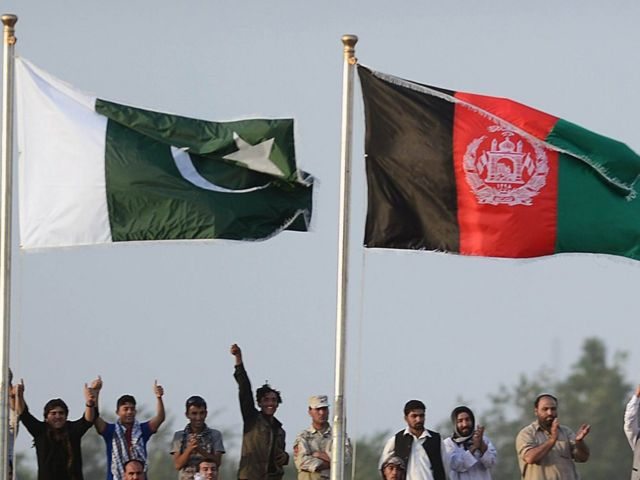The Afghan President Ashraf Ghani and Abdullah Abdullah, Chairman of the High Council for National Reconciliation, had no option but to remain stoic and exude calm as they made the rounds of Washington against the background of America’s definite departure, a shrinking lifeline and Taliban’s stunning territorial gains.
They discussed Afghanistan’s future with President Joe Biden, Congressional leaders, and defence officials—a future that is tangled up in a “peace agreement” in which they have a few cards to play. The United States (US) is also in a similar state since it gave up most of its leverage early on to get what was essentially a safe departure deal. Now, US officials are hanging on to the hope that the Taliban won’t attack troops as they withdraw.
The White House meeting with Ghani was meant to signal US support for the government but Biden was clear and unsentimental in stressing that it was now up to the Afghans to forge unity and take responsibility. He said he would do his “best” to give the Afghan government the “tools” it needs to keep fighting.
The White House meeting with Ghani was meant to signal US support for the government but Biden was clear and unsentimental in stressing that it was now up to the Afghans to forge unity and take responsibility. He said he would do his “best” to give the Afghan government the “tools” it needs to keep fighting.
Supporting the Afghan security forces is critical—both financially and materially—to prevent a civil war that may now engulf the country. The Taliban has registered remarkable successes and control nearly a third of Afghanistan. They hold 142 of the country’s 407 districts, more than 60 of them captured since Biden’s April announcement of a complete US withdrawal by September 11. The Biden administration’s diplomacy in and around Afghanistan is struggling—the peace conference in Turkey is yet to materialise, the intra-Afghan talks have floundered, and the Taliban are ostentatiously violent as they wrest more territory from the government’s control. Veiled US threats of international isolation and offers of a sanctions review created barely a ripple in Taliban’s world.
Pakistan: A thorn on the side
But no one is pointing at the real problem at hand: Pakistan’s support for the Taliban and its relentless proxy war against Afghanistan. Biden may have decided to end America’s “forever war” after 20 years, but he said not a word about forcing an end to Pakistan’s forever war, the mother lode of violence and mayhem in the region.
Biden knows the Taliban are Pakistan’s protégés, secure in their safe havens, launching attacks in Afghanistan, and returning home to headquarters. The leaders even use Pakistani passports to travel around from capital to capital. Biden must also know that Pakistan is the reason America lost the war or didn’t win, whichever way he may want to characterise the outcome.
Biden knows the Taliban are Pakistan’s protégés, secure in their safe havens, launching attacks in Afghanistan, and returning home to headquarters. The leaders even use Pakistani passports to travel around from capital to capital. Biden must also know that Pakistan is the reason America lost the war or didn’t win, whichever way he may want to characterise the outcome.
None of this is a secret and hasn’t been for decades despite occasional Pakistani denials. Yet president after president in the US has felt compelled to maintain the lie on Pakistan and pretend the gains were bigger than the losses, including the loss of more than 2,300 US military personnel. Former president Donald Trump did try to change the dynamics by putting pressure on Pakistan but decided quickly that getting the US troops out was a more productive re-election strategy.
Biden came into office already convinced and his impatience showed even as his top officials searched for ways to change the balance in favour of Kabul and cajole Rawalpindi to allow limited access for future operations. As Gen. David Petraeus, the Former Commander of US and NATO forces in Afghanistan, has repeatedly said, the US will regret the decision to withdraw troops and conclude that it should have maintained a credible presence on the ground to help the Afghan security forces.
Pakistan understands the pressures of American politics, the impending mid-term elections, the short timetable for Biden to accomplish his domestic agenda and his limited foreign policy goals. However, reforming Pakistan is not one of them.
Pakistan understands the pressures of American politics, the impending mid-term elections, the short timetable for Biden to accomplish his domestic agenda and his limited foreign policy goals. However, reforming Pakistan is not one of them.
The progressive wing of the Democratic Party doesn’t want to call Pakistan out—many are straight out apologists while others don’t want to complicate their liberal beliefs by allowing reality to interfere. They don’t issue statements on Pakistan-supported Taliban or Pakistan-sponsored terrorism in Kashmir.
The entire Washington ecosystem—barring a few notable exceptions—is complicit in whitewashing Pakistan’s dangerous role and softening the edges. You can read “smart” analysis on Afghanistan’s grim future, its squabbling leaders, its rampant corruption, and never see Pakistan mentioned.
Both The Washington Post and The New York Times gave the floor to Imran Khan—he is pretty much a regular now—before and during Ghani’s visit to mouth inanities and play victim. The PR gamble was obvious but it paid off. The fact that Pakistan plays this “partner-for-peace-in-Afghanistan” with every change in the US administration is lost in the shuffle. As C. Christine Fair, a South Asia Expert and Professor at Georgetown University, says, “We went to war in Afghanistan with a “partner” whose own interests were at odds with those of the United States. Throughout this process of negotiation, the US government wants us to believe that the Taliban are independent actors capable of bringing peace to Afghanistan. This is fiction.”
Unless the US is able to break free from the web Pakistan has spun around it for decades, no real peace can materialise in South Asia. Just as the American mind has clarified on China after decades of supporting and selling technology to Beijing and engineering its rise, it needs to defog on Pakistan; now that standard excuses don’t apply—the US will no longer be dependent on Pakistan for supplying US troops since they are withdrawing from Afghanistan.
















